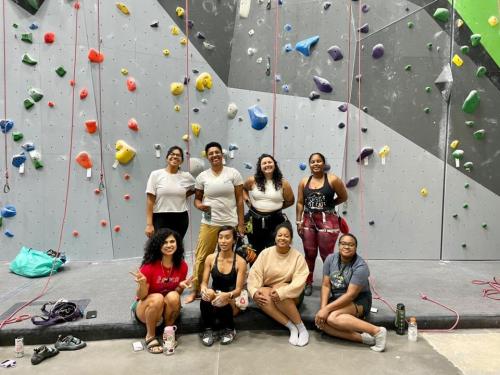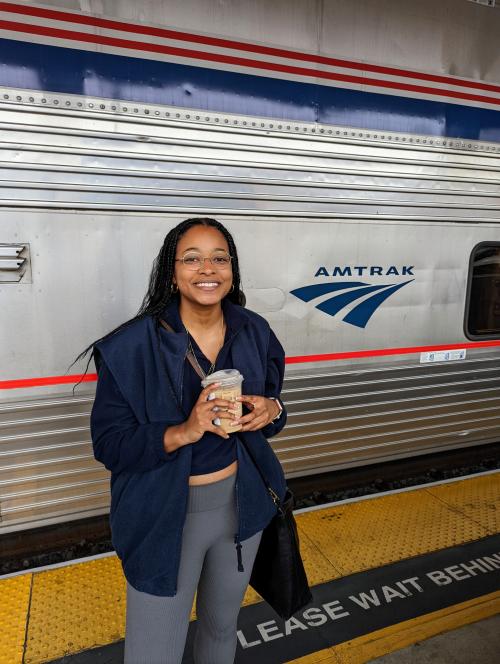
Ashleigh Rawls
Born and raised in Raleigh, Ashleigh is a third-generation HBCU alum who unwinds from studying stress with pickleball, ramen, and pub trivia with friends.
Trainee Spotlight is a series of interviews from the Duke Institute for Brain Sciences that showcases the science and lives of the people behind the lab coats studying the brain at Duke. Want to suggest someone for the series or nominate yourself? Email the DIBS Director of Communications Dan Vahaba.
This interview has been edited for length and clarity.
How did you get started in science?
I was really fortunate in high school that my chemistry professor had a Ph.D. She was really engaging and a great mentor, and I feel like she approached the subject with a lot of respect and curiosity. That set this standard that Ph.D.’s are people who just deeply love the subjects that they study, and that is something I think is still true.
I studied biochemistry and mathematics at Hampton University, where I was in the MARC program for maximizing accessibility for research careers—essentially an HBCU pipeline program to get students into PhD and MD-PhD programs. As a student in the department of chemistry, I was able to walk the line and see what it'd be like in biomedical science. Ultimately, it was issues related to health that caught my attention and held it.
I've been really fortunate that I've had really awesome old people in my life to show me what aging can be and should be and how to do it with dignity. It's a point that most of us hope to reach in our lives, and thinking about it in a forward way is really important.
I also did the Duke Scholars of Molecular Medicine Program and spent a lot of time in Parkinson's and movement disorders clinics, which was a very impactful time. I saw in action how there's a lot of misconception around neurodegeneration. People are still living full lives and trying to enjoy themselves and their family, and I found that to be really inspirational and motivational. Doing whatever we can to preserve quality of life throughout the course of life, I think, is an important focus for health efforts.
What do you research?
Essentially, I'm characterizing how the neuro-immune system plays a role in stress responses and how that results in anxiety behaviors. In the Bilbo lab, I'm focusing on the response of microglia, looking at how these neural immune cells are playing a crucial role. Right now, we're really digging in and characterizing why adult mice get anxious. I've established a pretty interesting model of pharmacological stress.
I am really excited about what we're learning in psychiatry. I'm ultimately most passionate about aging, so I'm excited that this model is something that's relevant to very adult mice. And I think in the future, I would love to see what mood modulation looks like in an aging mouse, maybe how that's dysregulated in neurodegeneration—taking what we know and understand and seeing how that manifests in aging people who may or may not be affected by dementia and other disorders that also affect cognition and mood.
What's the big impact of your research?
I would hope that exploring models like this would allow us to study psychiatric conditions from a perspective that's different than sex. There's a lot of literature on sex differences in psychiatry, and I think that's really important. However, when we think about druggable targets—ultimately my background in pharmacology—convergent biology is also really important. The fact that what we're seeing is consistent across sex is really exciting. And studying those downstream mechanisms could open up different avenues for exploring new therapies.
What are you involved in on campus?
This year, I'm acting president of the Bouchet Society. It honors Edward Bouchet, who was the first Black person to earn a Ph.D. in the sciences. Essentially, the group is about community here on campus. We engage Black and brown Ph.D. students and host events once a month—let everyone be in one place and see each other because we're so spread out all over the place and still pretty small in number. We want to make sure that everyone gets to know each other and is able to form community outside of the people they come in with. I'm really excited about that and also handing it off to the really awesome younger students that we have here.
BOOST is also so incredible. It has expanding a lot. The point is to guide the students in middle school to get them interested and active in STEM. They're able to stay connected with the BOOST program and then BOOST Beyond looks at junior and senior students to try to get them into whatever is next after high school. Today, 100% of those students have gotten into school with some kind of financial aid or scholarships. It's a really amazing program. And then we realized, we're getting them into these places, and they still do need guidance because so many of these students are first generation, from disadvantaged backgrounds. They may not know what to do and how to navigate, which is where BOOST Infinity comes in to help them settle in and understand how best to take advantage of the opportunities they have, and nurture them in that transitional space of college.

What do you love to do outside of campus?
I'm really into science outreach and education. This is my fourth year working with BOOST, exposing students to science opportunities and career fields.
I also spend a good amount of time doing what I call social fitness—pickleball with friends. I'm in the Brown Girls Climb Durham chapter, which is really fun. I love to be active and spend time with my friends, outside and together. We're also pretty big fans of trivia. We did Fullsteam Brewery aggressively for a very long time. We actually took the podium a few times, and that was really exciting.
What are you looking to do after defending your thesis?
I’m excited to just be more accessible to my family and friends. It's been a very long road. It's been a lot of shortened holidays and 36-hour, in-and-out trips. I'm excited to slow down and spend more time with people in my community. Career-wise, I hope that I'm able to bring everything back to have some kind of impact on a larger scale, whether that is being a part of companies that are carrying out these really awesome therapeutic advances or from the policy route.
Where do you call home?
This is actually technically home. I was born and raised in Raleigh, North Carolina. But most of my family moved to Atlanta and the DMV (D.C., Maryland, Virginia) area. Home at this point is wherever I'm with friends and family, definitely not a place. I would say I consider Durham to be kind of home now. I've definitely had a very adult experience with a really rich community and a very differentiated life here compared to what I experienced just growing up and being raised in Raleigh.

You've been in the area for quite some time. Do you have a favorite restaurant?
I mention this place all the time. The best ramen I've ever had is from M Kokko. I really love that place. Honestly, Durham just has really great food across the board. I'd also say I really love Boricua Soul.
What is a fun fact people you work with might not know about you?
One fun fact that I'm very proud of is that I am third-generation HBCU educated on my mom's side. My grandmother went to St. Augustine University in Raleigh. My mom went to Hampton, and so did I. I really love having a legacy of education. I think as a Black woman, it's not common, and I'm really grateful for it.
What is a shareable lesson that you've learned thus far in academia?
Write out every little thing you need to do in the first hour of your day for it to be successful. I started this when I was doing summer internships and every day counted. Don't be afraid to really focus in on some of the details and be really clear with how you spend the first one to two hours of your day. It can really get away from you with seminars and coffee chats—classes, if you're doing that. It's not unproductive time, but sometimes you might look back and think, I just am not getting the things done that I want to get done. I would say look to the first two hours of your day and how you're spending that.
Our last question, the most important—what is the best pizza topping?
It's unequivocally pepperoni on a margherita pizza. It's iconic. People are using these fancy salamis and charcuterie toppings, and it's just dressed-up pepperoni.
If you are a Duke undergraduate, graduate, or postdoc student studying the brain and would be interested in taking part in an interview for this series or would like to nominate somebody, please reach out to Dan Vahaba, Director of Communications at DIBS.